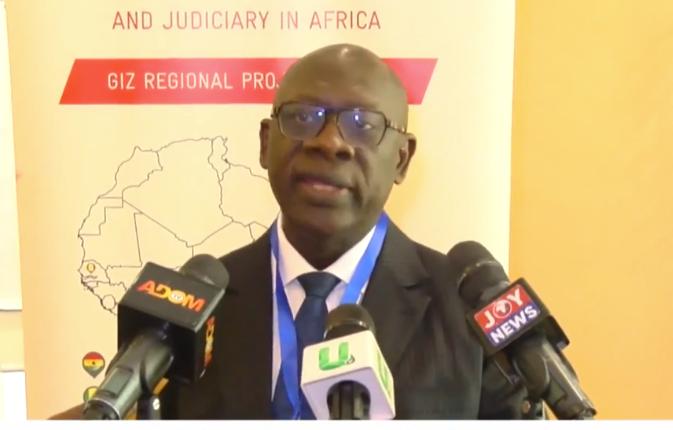Former Akuapem South MP, Hon. Osei Bonsu Amoah, has made a passionate call for immediate and comprehensive reforms to ensure all Ghanaians have free and sustainable access to the nation’s legal framework.
Speaking at a crucial two-day workshop organised by the Ghana Legal Information Institute (GHALII) in partnership with GIZ, Hon. Amoah stressed that the current limited access to legal information severely undermines the principles of justice, weakens governmental transparency, and poses a significant threat to the rule of law.
Under the theme, ‘Sustainable Public Access to Law for Ghana’, Hon. Amoah delivered a powerful argument for greater openness and availability of legal documents. He asserted that the fundamental right of every citizen to know the law is a cornerstone of any true democracy.
Also Read: Dr. Dwamena outlines NPP’s five-pillar financial reforms at 2025 Delegates Conference
“While every person is obligated to abide by the law, the state bears an equal responsibility to ensure that the law is readily available to all,” Hon. Amoah stated emphatically.
Drawing upon established international legal precedents, the former legislator questioned the fairness and practicality of the long-standing legal principle that ‘ignorance of the law is no excuse.’ He argued that this maxim becomes inherently unjust when the state fails to provide its citizens with reasonable means to access and understand the laws that govern them. He referenced notable case law, including R. v. William Chambers (2008) and Blackpool Corporation v. Locker (1948), to highlight how inaccessible laws erode the very foundation upon which the rule of law is built.
Hon. Amoah meticulously outlined the far-reaching and detrimental consequences of legal inaccessibility within Ghanaian society. These include the potential for:
- Unjust deprivation of individual liberty, privacy, and property rights.
- Uncertainty surrounding the creation or abolition of legal rights and duties.
- An increased risk of procedural irregularities within the judicial system.
- A lack of adherence to fundamental principles of public policy.
- The possibility of constitutional provisions being amended without the knowledge or understanding of the citizenry.
“The law wields significant power to transform lives, and this power must be exercised with the utmost transparency and fairness,” he declared.
According to Hon. Amoah, several key barriers currently impede access to legal information in Ghana. These include:
- The fragmented and uncoordinated nature of legislative sources.
- Inadequate legal frameworks governing the systematic publishing and revision of laws.
- Limited electronic access to up-to-date legislation.
- A scarcity of easily accessible public sales points for printed legal materials.
- The absence of a free, comprehensive, official electronic legal database.
“There is a glaring absence of a clear policy to ensure that the official versions of our laws are freely accessible online. This situation must be rectified without delay,” Hon. Amoah insisted.
He lauded countries such as the United Kingdom, Australia, and New Zealand as exemplary models that Ghana could effectively emulate. He highlighted the UK’s successful collaboration between Her Majesty’s Stationery Office and the Statutory Publications Office, which resulted in the creation of a comprehensive online legislation platform. Furthermore, he pointed to Australia’s Legislation Act, 2003, and New Zealand’s Legislation Act, 2012, both of which mandate the free online publication of authoritative legal texts.
“We have a valuable opportunity to learn from these successful models and construct a robust and comprehensive system tailored to the specific needs of Ghana,” he added.
Addressing the workshop on behalf of the Speaker of Parliament, First Deputy Speaker Bernard Ahiafor echoed the sentiments expressed by Hon. Amoah, emphasising the critical need for robust institutional collaboration. He advocated for strong partnerships between key stakeholders, including Parliament, the Judiciary, legal professionals, academia, civil society organisations, and regional bodies. The goal of such collaborations would be to develop an integrated and automated digital system encompassing all laws, judgments, and gazettes.
“We must forge a clear and achievable roadmap, demonstrating an unwavering commitment to our citizens that, by the year 2027, every Ghanaian will have comprehensive access to all laws, judgments, and gazettes conveniently at their fingertips,” Mr. Ahiafor affirmed.
Mariya Badeva, Director of AfricanLII at the University of Cape Town, presented a sobering assessment of Ghana’s current standing. She revealed that a mere 18 months ago, Ghana received a score of zero on the Open African Law Index, primarily due to the absence of free public access to fundamental legal documents. The index serves as a crucial benchmark, evaluating governments’ efforts in providing essential legal materials such as legislation and case law online, specifically assessing whether this access is free, authoritative, and consistently up to date.
“This index underscores the fundamental role that access to legal information plays in underpinning good governance, fostering economic resilience, and ensuring effective public service delivery,” she explained.
However, Ms. Badeva acknowledged the significant strides that Ghana has made in recent times. With crucial support from the Judicial Service of Ghana, court judgments are now being published online and made accessible to the public for the very first time.
Participants at the workshop engaged in intensive deliberations, focusing on developing practical strategies to promote open, timely, and reliable access to legal information across the nation. A strong consensus emerged, highlighting that improved legal transparency is not merely desirable but essential for strengthening Ghana’s democracy, enhancing the administration of justice, and ultimately fostering greater public trust in governance.


